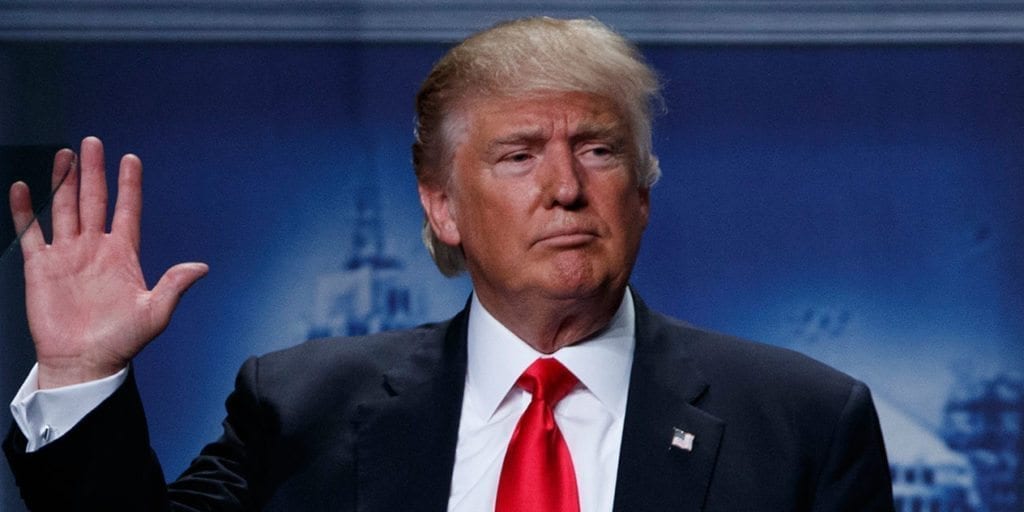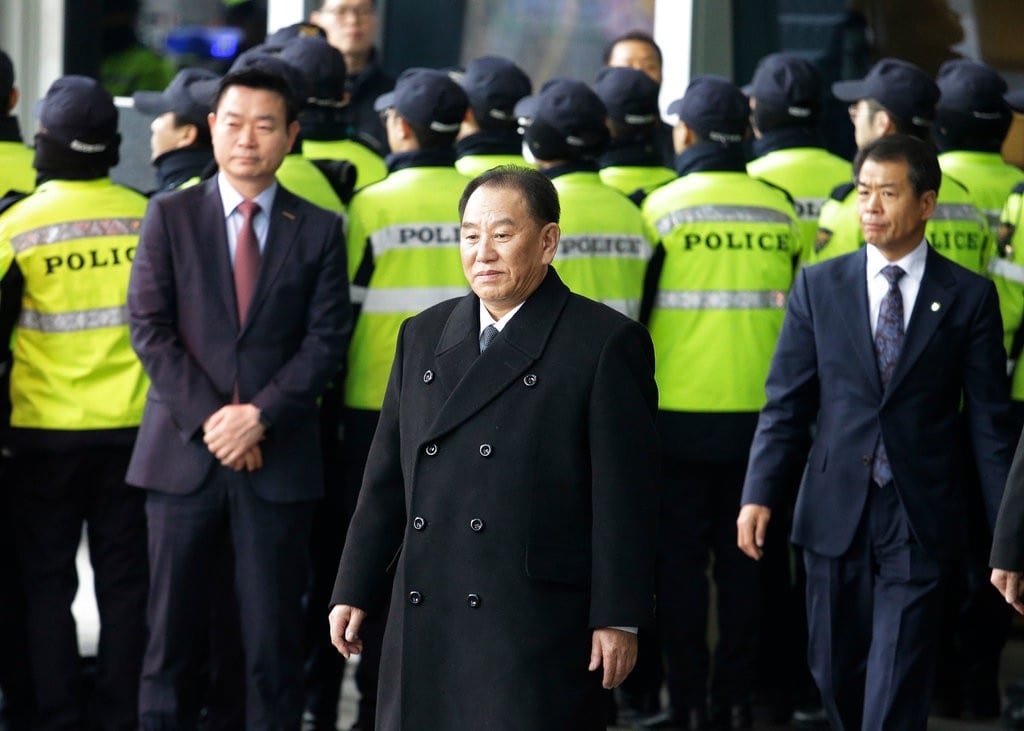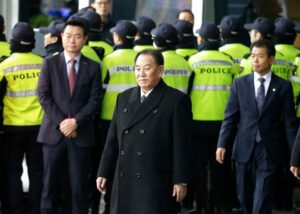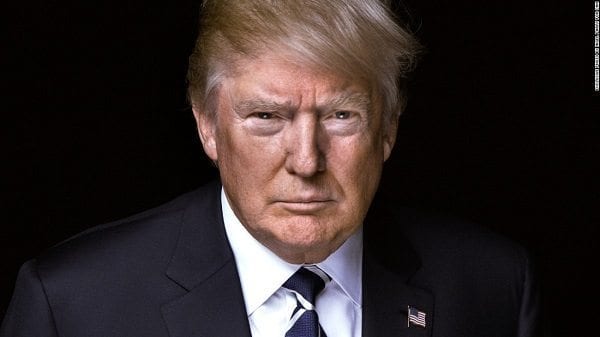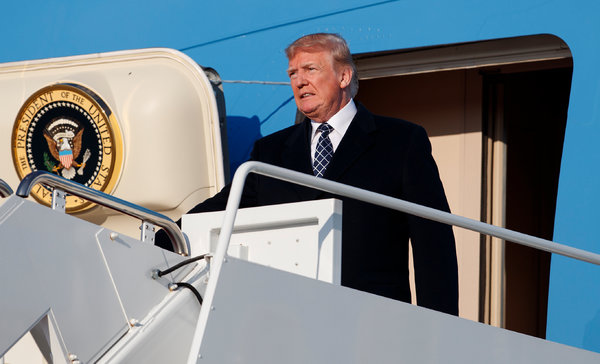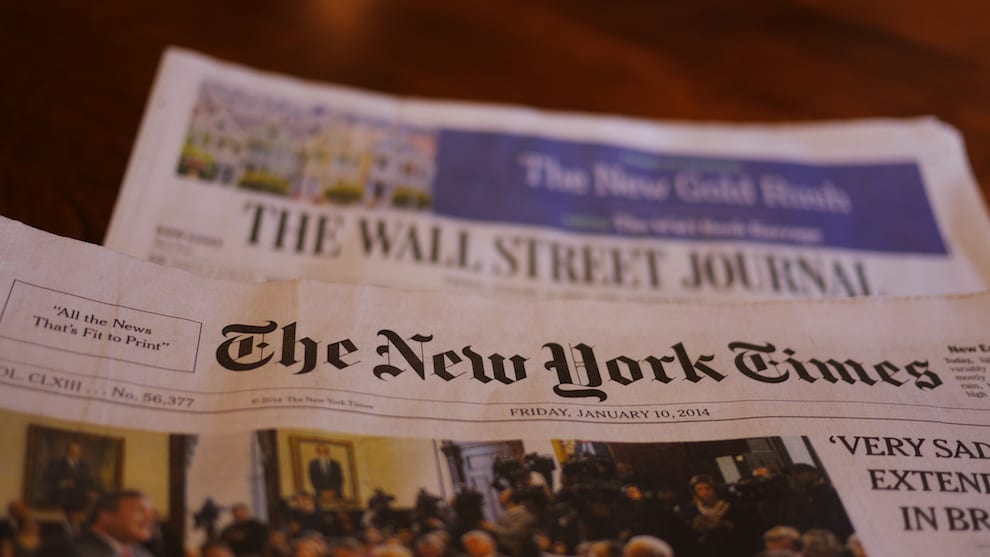When the president eventually exits the White House, the rest of us will quickly have to make sense of the world he’s left behind.
By Stephen M. Walt
| August 30, 2018, 1:23 PM
Donald Trump speaks during an event to announces a grant for drug-free communities support program, in the Roosevelt Room of the White House in Washington, DC, on August 29, 2018. (MANDEL NGAN/AFP/Getty Images)
One of the many unfortunate consequences of U.S. President Donald Trump’s cavalier, corrupt, and capricious handling of foreign policy is that it discourages farsighted thinking about the global agenda. Even worse, it is gradually undermining the institutional capacity the United States will need to deal with that agenda. To a first approximation, the people who are most alarmed by his actions (and I include myself among them) are spending a lot of their time circling the wagons and trying to minimize the damage that he and his minions do while in office. They are like parents trying frantically to corral a rambunctious toddler (hat tip to Dan Drezner) who is running amok through a china shop: All the attention is on saving as much of the crockery as possible, and nobody has any time to think about what they’ll do once the kid has finished smashing things.
It’s understandable that people are trapped in a reactive mode, because Trump’s genius is his ability to make nearly everything all about him and to focus attention on whatever his latest outrageous antic is. What other president could or would make himself the center of attention when a prominent senator died or express his disagreement with an important allied leader by tossing candy at her? Trump may be terrible at running the government, but his ability to command attention through outrageous behavior makes Madonna look like an amateur.
Trending Articles
The Myth of Erdogan’s Power
Far from a sultan, the Turkish president is hemmed in by the nationalists who back him—and they don’t want him to get…
Yet we should resist the urge to remain in a defensive crouch. Yes, there’s a lot of damage being done these days, and resisting Trump’s worst impulses is important. But there are plenty of problems out there that will require attention in the not-too-distant future, and where the appropriate solutions aren’t immediately obvious. Careful and creative thought will be needed to figure out an appropriate destination and then to chart a course to get there. It is not too soon, therefore, for foreign-policy mavens to start thinking about the post-Trump world, not simply to restore the pre-Trump status quo but in order to figure out arrangements that acknowledge new realities and are appropriate for the conditions we will face in the future.
No doubt each of you has your own list of priorities, but for what it’s worth, here are a few of mine.
#1: The Architecture of Great Power Politics
About the Author
Stephen M. Walt is the Robert and Renée Belfer professor of international relations at Harvard University. @stephenwalt
When he ran for president back in 1992, Bill Clinton once declared that “the cynical calculus of pure power politics simply does not compute. It is ill-suited to a new era.” He was expressing the widespread belief (pious hope?) that humanity had turned a corner at the end of the Cold War, and that the old logic of great power rivalry was now behind us. He was dead wrong, alas, and great power politics are now back with a vengeance.
But the form and intensity of that rivalry remains open, and the nature of relations among today’s great powers needs to be shaped through farsighted diplomatic action. Will the United States disengage and let Europe and Asia (mostly) go their own way? Will the United States, its NATO allies, and Japan link up with others to contain Russia, China, and their various regional partners? Should the United States make a concerted effort to drive a wedge between Moscow and Beijing, perhaps by trying to work out an agreement on Ukraine and promoting a security architecture for Europe and Russia that reduces each side’s fears? Where will countries like India fit into the constellation of great powers, and where should the United States want it to be?
It is all well and good to obsess about “saving NATO” or “preserving a liberal order,” but those short-term, reactive goals do not eliminate the need to think hard about what sort of great power relations are realistic and desirable in the decades ahead. At key moments in world history—such as 1815, 1870, 1919, 1945, and 1993—the leaders of the great powers had to imagine and then try to implement visions of great power politics designed to preserve key interests, ideally without (much) resort to force. They were sometimes successful; at other key moments, they failed miserably. The problem cannot be avoided, but we are more likely to end up with arrangements we like if we start thinking through the possibilities now.
#2: The Brave New World of Cyber:
I’m the first to admit that I didn’t foresee all of the ways that digitalization, social media, and other aspects of the cyber-world would shape both international and domestic politics. Sure, there’s been a lot of hype and threat inflation about cybersecurity, cyberwar, and cyber-everything else, but in 2018 it’s impossible to deny that these issues are affecting us all in pretty far-reaching ways. Indeed, even the suspicion that bad guys are using the internet to manipulate politics can have effects all on its own.
Read More
Justin Trudeau Can’t Take Any More Humiliation
Unless Canada’s prime minister strikes a trade deal on his own terms, Donald Trump’s bullying won’t stop.
Argument |
Jonathan Kay
Trump Wants to Help Israel by Cutting Aid to Palestinians. Why are Some Israelis Worried?
Cuts could deepen economic crisis in the West Bank and Gaza and lead to violence.
Argument |
Neri Zilber
In Tacit Rebuke, U.S. Embassy in South Africa Rejects Trump Tweet
Internal cable cites report that farm murders in South Africa are at their lowest level in 19 years.
Exclusive |
Robbie Gramer, Colum Lynch
Instead of moving energetically to address these issues, however, Trump fired the White House cybersecurity coordinator and eliminated the position, repeatedly denied that anybody interfered in the 2018 election, and now is tweeting out accusations that Google is biased against him. Instead of developing a coherent U.S. policy and trying to negotiate an international code of conduct that might mitigate these problems, he’s kicking the can down the road.
But does anyone believe these issues will simply disappear on their own? Surely not. Which means more farsighted people will have to start developing policies that can preserve the benefits of the digital revolution while protecting us from its dark downside.
#3: New Institutions for the World Economy
It is now obvious that contemporary globalization did not deliver as promised for millions of people—though it did have significant benefits for the Asian middle class and the global 1 percent—and that the main institutions set up to manage global trade and investment need serious rethinking. This is partly because some countries (e.g., China) have complied poorly with some of the rules, though no country’s track record is perfect, and because unfettered globalization did not allow individual countries to tailor arrangements in order to support key cultural or national priorities.
This is not my area of expertise, and I’m not going to offer any detailed advice on what should be done. For what it’s worth, I find my colleague Dani Rodrik’s arguments on allowing nations greater autonomy within the global trading and investment order, so that their participation does not produce wrenching social dislocations at home, convincing. Less globalization might be more, therefore, but less globalization does not mean zero.
As near as I can tell, the Trump administration’s approach to these issues has been to use U.S. economic leverage to bully other countries into making minor economic concessions, which Trump can then hail as the “beautiful” new trade deals that he promised back in 2016. That’s what happened with South Korea and what appears to be happening with NAFTA. But what’s missing, at least so far, is any attempt to develop a larger set of institutions or arrangements that would safeguard the wealth-enhancing elements of (mostly) open trade and avoid both the obvious costs of a trade war and the social turmoil of hyper-globalization. Again, it’s not my field, but I sure hope Dani isn’t the only person thinking about what a new global economic order should look like.
#4: Whither the Middle East?
If the architecture of great power politics is now uncertain and will require creative diplomacy to adapt to and shape, that goes double in the troubled Middle East. Thus far, the Trump administration has mostly doubled down on supporting America’s longtime Middle East partners: giving a free hand to Israeli expansionism, backing Abdel Fattah al-Sisi’s military dictatorship in Egypt, and encouraging Saudi Crown Prince Mohammed bin Salman’s ambitious domestic reforms and his increasingly reckless regional behavior (most notably and tragically in Yemen), as well as ramping up pressure on America’s perennial bête noire, Iran. Trump has also stumbled into a pissing contest with President Recep Tayyip Erdogan in Turkey, but Erdogan is at least as prickly and desperate for scapegoats as Trump himself, and a cynic might argue that the two leaders deserve each other.
Although it’s possible that National Security Advisor John Bolton will still get the war with Iran that he has long favored, the bigger questions are what the U.S. role in the region will be over the longer term and how it will deal with problems that are going to come home to roost eventually. Former Presidents Clinton, George W. Bush, and Barack Obama all openly backed a two-state solution between Israel and the Palestinians, for example, and each tried to bring it about in their own not-very-effective fashion. The two-state solution is now on life support if not completely dead, however, which raises the obvious question: If “two states for two peoples” is impossible, then what is does the United States support? Does it believe Israel should become a one-state democracy, with full political rights for all inhabitants, including the Palestinians who are now under strict Israeli control and denied political rights? Do Americans think those Palestinians should be kept in a state of permanent subjugation (aka apartheid)? Is the United States in favor of Israel expelling them to some other country? Nobody really wants to think about awkward questions such as these, let alone answer them, but Trump’s successors are going to get asked. Might be a good idea to start formulating a response.
And that’s just one issue. The United States will also need to figure out if it wants to continue its (mostly futile) efforts to mold local politics all over the region or revert back to the strategy of “offshore balancing” that it employed there from 1945 to roughly 1991. Should it strive for a modus vivendi with Iran—in the service of maximizing U.S. leverage and maintaining a regional balance of power—or continue to flirt with regime change? And it is worth asking if the Middle East is even as vital a region as it once was, given the shale gas revolution back in the United States, the imperative to reduce fossil fuel consumption, and the rising strategic importance of Asia?
#5: Rebuilding Foreign Policy Capacity and Expertise
Unfortunately, the United States will be grappling with all of these problems with a severely depleted foreign-policy capacity. The travails of the State Department are well known, but there has also been exceptionally high turnover among key Trump aides and a general erosion of nonpartisan experience and expertise throughout the government. Trump’s repeated attacks on the intelligence agencies and his efforts to politicize the civil service aren’t helping either. Lord knows I’m critical of the “Blob” and its tendency not to hold itself accountable and to stick with strategies that aren’t working, but the answer is a better foreign-policy establishment, not amateur hour.
Accordingly, planning for a post-Trump world will also require a sustained effort to rebuild the institutional and administrative capacity for an effective foreign policy. Having an effective and professional civil and foreign service is critical in a system such as America’s, because so many top jobs get replaced whenever the White House changes hands, and many senior officials take months if not years to be nominated and confirmed. Moreover, a lot of them stay in their posts for only a year or two, creating further disarray and churn within the government. Add to that America’s odd practice of letting big campaign donors serve in important diplomatic posts or management positions, and you have a recipe for trouble.
This problem wouldn’t be a big issue if the United States had modest foreign-policy goals, but that is hardly the case. Instead, it is trying to run the world with perhaps the most disorganized and dysfunctional system imaginable. Accordingly, farsighted patriots need to start planning how to restore expertise, analytic capacity, and accountability now, so that this process can begin swiftly once Trump is gone.
The list presented here is far from complete, and it’s easy to think of other issues (e.g., climate change, proliferation, migration, etc.) where imaginative thinking is going to be needed. But my central point remains: Preserving the status quo against Trump’s wrecking operation is not enough. Instead of just playing defense, his critics need to start thinking about the positive goals they intend to pursue once he’s left the political stage. And there’s an added benefit in this course of action: The most obvious way to convince Americans that Trump’s policies are mistaken is to show them a better alternative.
Stephen M. Walt is the Robert and Renée Belfer professor of international relations at Harvard University. @stephenwalt
View
Comments
Tags: Diplomacy, Military strategy, Politics, Trump, Voice
Trending Now Sponsored Links by Taboola
Dream of a Career in Sneakers? Here’s How.Fashion Institute of Technology
Western Boot Lovers Are Going Crazy Over This New BrandTecovas
Your Knees Will Wish You Did this years agoInstaflex Advanced Supplement
This Simple Tip Will Keep You From Snoring Ever AgainSnore B Gone
By Taboola
More from Foreign Policy
A Map of China, By Stereotype
How the Muslim World Lost the Freedom to Choose
Forget Sykes-Picot. It’s the Treaty of Sèvres That Explains the Modern Middle East.
A Dutch Newspaper Finds the Perfect Way to Explain Trump
By Taboola
Latest
U.S. to Canada: Deal or No Deal?
August 30, 2018, 5:01 PM
Don’t Buy the Panic About the Rupee’s Fall
August 30, 2018, 3:52 PM
Justin Trudeau Can’t Take Any More Humiliation
August 30, 2018, 2:28 PM
Planning for the Post-Trump Wreckage
August 30, 2018, 1:23 PM
Western Officials Ignored Myanmar’s Warning Signs of Genocide
August 30, 2018, 12:36 PM
See All Stories
Trending
- 1
Planning for the Post-Trump Wreckage 16 Shares
- 2
Justin Trudeau Can’t Take Any More Humiliation 4 Shares
- 3
India Is Getting Cold Feet About Trump’s America 39 Shares
- 4
U.S. to Canada: Deal or No Deal? 11 Shares
- 5
U.S. to End All Funding to U.N. Agency That Aids Palestinian Refugees 6632 Shares
Voices
Planning for the Post-Trump Wreckage
Stephen M. Walt
America Needs the Muhammad Ali Doctrine
Stephen M. Walt
The Death of the Gentle Peacemaker


